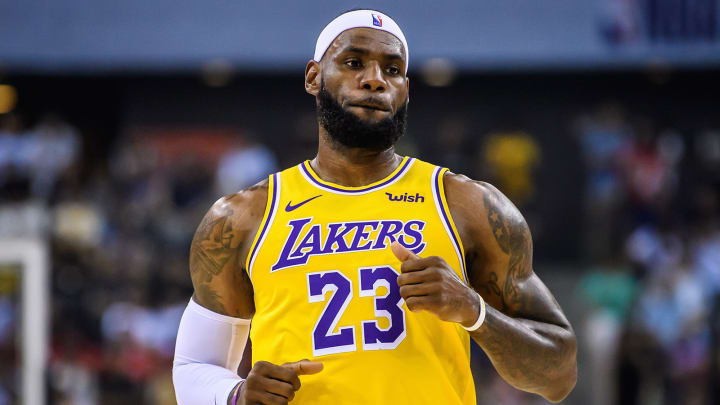Unpacking LeBron James’s Comments on China, Daryl Morey and the NBA


LOS ANGELES — I’m basically going to do my best to talk about the myriad implications of LeBron James’s Monday night comments with regards to Daryl Morey and China. If you don’t know what happened between Morey and China, what in the world are you doing here? If you’re unclear about what LeBron said, I’m more forgiving, so here’s a recap.
First, what he said to reporters before the Lakers’ preseason game against the Warriors:
“I don't want to get into a ... feud with Daryl but I believe he wasn't educated about the situation at hand and he spoke," James said. "So many people could have been harmed, not only financially, but physically, emotionally, spiritually. Just be careful what we tweet ... even though, yes, we do have freedom of speech. But there can be a lot of negative that comes with that too.”
James was immediately criticized for his remarks, which seemed to echo the notion that what was happening between China and Hong Kong was complicated, as opposed to a very basic resistance of authoritarian rule on the part of Hong Kong. James tried to clarify the remarks with two tweets soon after:
Let me clear up the confusion. I do not believe there was any consideration for the consequences and ramifications of the tweet. I’m not discussing the substance. Others can talk About that.
— LeBron James (@KingJames) October 15, 2019
My team and this league just went through a difficult week. I think people need to understand what a tweet or statement can do to others. And I believe nobody stopped and considered what would happen. Could have waited a week to send it.
— LeBron James (@KingJames) October 15, 2019
There’s obviously a lot going on here, let’s try to sort through all the layers.
1. First and foremost, LeBron had enough time to be better with his statement. He failed to live up to the standard of his own eloquence here. James could have stuck to certain tacts—like player safety, perhaps—and still protected his business interests in China, if that was ultimately his main objective. Calling Morey "misinformed" and bringing up the financial aspect ultimately hurt James. The simplest option would have been for LeBron to say, “I support free speech.” Who knows what LeBron thinks about Hong Kong? I do know a lot of Americans criticizing James in the aftermath of his comments weren’t thinking about Hong Kong for even one second of their day as recently as two weeks ago. What every NBA person asked about China probably needs to realize moving forward is—if they’re desperate to avoid Hong Kong—this can be an issue of speech instead of substance. Again, Morey’s tweet wasn’t even that radical! (Him deleting it should actually be a bigger deal.)
What every NBA person asked about China probably needs to realize moving forward is this is more so an issue of speech than substance. Again, Morey’s tweet wasn’t even that radical. It’s the fact that the Chinese government threatened to do so much over one U.S. citizen—who realistically has very little bearing over how the NBA does its business in China—giving his opinion. Players and coaches don’t have to support Hong Kong in order to support Morey. If players don’t want to walk into a geopolitical “minefield,” they should just fall back on free speech and avoid talking about a situation seemingly nobody in the league—like many Americans before Morey sent his tweet—has a normal understanding of. But LeBron had a lot of options on Monday. And he picked a pretty confounding one.
2. LeBron, as well as several other players, have a right to be upset at Morey. You know who hasn’t had to answer any questions in front of a horde of reporters yet? The guy who started all of this! Players and coaches are basically going to have to speak continuously about all this, and even though there are some simple answers on the table, I’m sympathetic to the idea that the burden shouldn’t fall on them. Again, this was an issue that probably a majority of NBA fans were not considering before Morey’s tweet. The NBA has been doing business with China for decades and has come out unscathed. The relationship has been good for the league, the players, the owners and the shoe companies.
But because Morey flapped his wings and hit send, people like LeBron are being forced to answer for something that they’d probably never thought twice about—and no one cared to question them about—until the Chinese government reacted harshly to Morey. I can see why that’s frustrating. I also think people are generally undervaluing the concerns Lakers and Nets players had about their well-being in China, which was probably an incredibly confusing time.
LeBron should have handled his comments more thoughtfully. At the same time, the sentiment that a player would be facing harsher discipline for costing the league money like Morey theoretically has is a valid one, and that’s probably influencing this situation on some level in terms of what’s being said.
3. Again, James didn’t really live up to his own expectations on Monday. But that doesn’t disqualify any public stances he’s taken in the past. You’re going to see a lot of bad faith takes over the next couple of days. Please try to be smart about this. LeBron has advocated for gun control. He’s campaigned for Hillary Clinton. He wore an “I Can’t Breathe” shirt. These are not simple public stances for an athlete of his stature to make, particularly a black one who has had the n-word spray-painted across his property.
Yes, LeBron was probably looking out for his own economic interests on Monday. But that doesn’t mean he deserves any more criticism than the NBA itself, or Nike, or Disney, or any other corporation that has far deeper ties with China just because he’s had the temerity to speak out on issues important to him before. It’s practically impossible to be ethically pure amongst corporate globalization and capitalism. LeBron has set a high standard for himself in the public sphere, but it’s also okay if he cares about some social issues more than others, especially the ones that hit close to home for him. The situation in Hong Kong is actually pretty easy to weigh in on—and LeBron should have realized that—but expecting athletes who are passionate about certain causes that they have a personal connection to to then also have the same level of passion for this other issue is something bad actors will try to have a field day with—especially the people who haven’t cared for James’s political leanings previously.
4. The bottom line is this: Why isn’t it simple enough for the NBA (and its employees) to endorse free speech and not Morey? If the league and its players don’t want to touch the Hong Kong issue—which again, is remarkably uncomplicated—honestly, they don’t even have to. Just say Morey doesn’t speak for anyone but himself, but he exercised his American right to have an opinion about something. If people are worried about doing something as benign as that and still angering China, then it may be time to reconsider the entire relationship.
